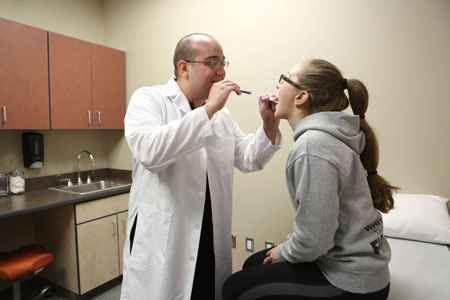Originally published Dec. 14, 2015
By Laura L. Acosta
UTEP Communications
Growing up in a low-income household, the only time Michael Zavala and his family would see a doctor was in the emergency room when they were in serious need of medical care.
“That impacted me,” said Zavala, who was inspired to become a nurse to care for people like his parents and siblings who had little access to health care. Zavala earned a Bachelor of Science in Nursing degree from The University of Texas at El Paso in 2008.

As a registered nurse in the intensive care and cardiovascular intensive care units at University Medical Center for six years, Zavala saw the toll that delaying medical care took on a person’s health, often leading to more serious medical conditions. But he also realized that without an advanced practice nursing degree, he was limited on the amount of care he could provide.
“In the ICU and CVICU, you see people close to the end of their lives,” Zavala said. “These are people who have had chronic diseases – diabetes, hypertension, high cholesterol – that could have been controlled, but they don’t have a regular doctor. By the time they’re here, they’re already at the end stage of their disease.”
Zavala began the Family Nurse Practitioner (FNP) program at the UTEP School of Nursing two years ago. Family nurse practitioners provide primary health care to patients, including diagnosing and managing their acute and chronic illnesses. They also promote disease prevention and education in the community.
During UTEP’s afternoon Commencement ceremony on Saturday, Dec. 12, Zavala was one of 47 students who graduated from the Master of Science in Nursing program for family nurse practitioners – the largest graduating cohort in the program’s history. The program is the only one available in the borderland and provides flexibility as courses are taken online.
A family nurse practitioner assumes responsibility for promoting, maintaining and restoring health to individuals and families across their life span. They assess, diagnose and manage patient problems, order tests and prescribe medications.
As the aging population increases in the United States, more primary care providers are needed to keep up with the demand for health care services. A shortage of primary care providers has resulted in longer wait times in health care settings, shorter doctor’s visits and a larger workload for doctors.
According to the City of El Paso’s Department of Public Health 2013 Community Health Assessment, the availability of primary care physicians is more limited in El Paso County than in the rest of Texas.
Forty-one percent of residents in El Paso County do not have access to a regular primary care provider, which is more than double the 19 percent average in the U.S. It is also above the Texas average of 26.5 percent.
However, an increase of nurse practitioners in the primary care workforce has helped to make up for the shortage of doctors.
“FNPs are filling the health care gap between the providers we have now and the number of providers we need,” said Leslie K. Robbins, Ph.D., associate professor and assistant dean for graduate education in the UTEP School of Nursing. “Their education is very focused on the skills that they need to be able to provide primary care services in the community. We work in collaboration with other health care providers to be sure that the entire continuum of care that is needed by patients is provided to them.”
There are more than 200,000 nurse practitioners in the U.S; nearly 10,000 of them practice in Texas. FNPs in the state must work under physician supervision.
“I definitely feel like I have the education and the tools to help people in my community,” Zavala said. “As a family nurse practitioner, I can give them access to primary care and preventive medicine. It’s great because I feel like I can actually make an impact on people’s lives. I can point them in the right direction about managing their own health.”
UTEP’s online nurse practitioner program offers three advanced practice registered nurse concentrations: family nurse practitioner, pediatric nurse practitioner and adult/gerontologic acute care nurse practitioner.
The online program is a flexible alternative for nurses seeking to advance their practice while fulfilling their professional and personal commitments. During the last three semesters, students may be required to come to campus at least three times per semester.
Samantha Wild, a U.S. Air Force flight nurse for 19 years, kept up with her studies while she was deployed to Ramstein Air Base in Germany from September 2014 through February 2015. The single mother of three daughters traveled back and forth between Ramstein and Bagram Air Field in Afghanistan on aeromedical evacuation missions, transporting wounded soldiers for medical treatment.
“I chose the UTEP nursing program because I felt it reflected the same vision and goals I would like to pursue,” said Wild, who is stationed at Joint Base San Antonio-Lackland. She graduated from UTEP with a 3.9 GPA. “I look forward to utilizing all of the skills and knowledge I have gained so that I may apply what I have learned to help take care of my fellow wounded warriors.”
For information about how to apply to the UTEP Nurse Practitioner MSN (Online Degree), click here.